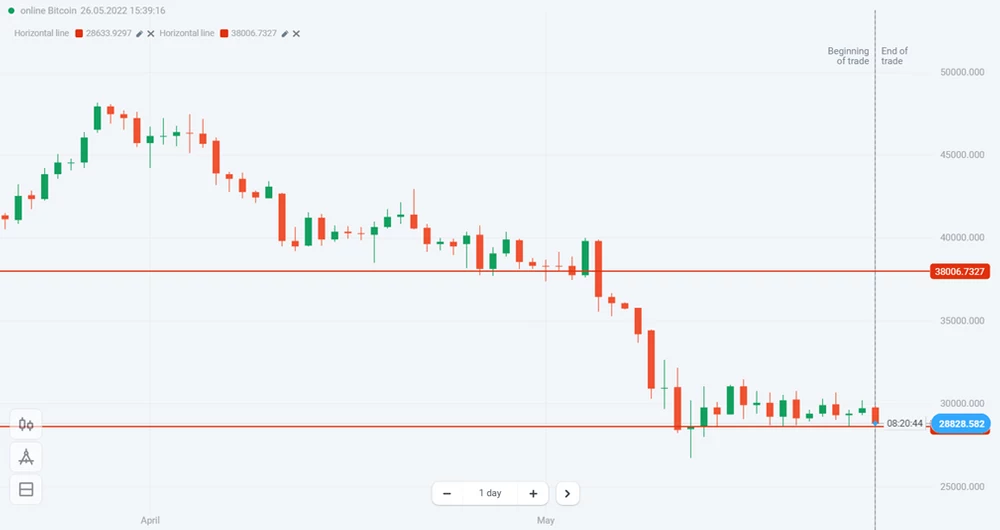In this digest, we will discuss how different markets are responding to the rapid increase of inflation, central bank moves, and sanctions.
Weekly Trends
JP Morgan ↑ 7.55%
Trading Up with $100 and a X20 multiplier on Forex FiduCenter, you could have easily made $151.
NZD/USD ↑ 1.54%
Trading Up with $100 and a X500 multiplier on Forex FiduCenter, you could have easily made $770.
USD/CHF ↓ 1.35%
Trading Down with $100 and a X500 multiplier on Forex FiduCenter, you could have easily made $675.
Currency Markets
The FOMC Meeting and the Release of Fundamental Data Serve as Short-term Catalysts
Pressure on public finances is piling up due to the sharp rise in interest rates globally since the beginning of the year, but some fundamental data may bring more optimism to markets.
Last week, the US Federal Reserve Chair, Jerome Powell, once again reiterated his intention to raise the key interest rate by 0.5% at the FOMC meetings in June and July. That will likely increase the cost of various loan types to industry and residents including mortgage loans, consumer loans, and credit card interest.
The Fed Minutes released on Wednesday indicate that officials are prepared to move ahead with multiple 50 basis points interest rate increases. In addition, the Federal Open Market Committee said policy might have to move past “neutral” into “restrictive” territory. The Minutes also indicate that the members are hopeful they could reduce inflation but are also concerned about financial stability risks.
Investors’ concerns are mainly due to the EU’s strong dependence on Russia’s energy resources. Two weeks ago, European Union countries began negotiations on the sixth package of sanctions against Russia for its military activities in Ukraine.
This relates to the introduction of an embargo on the purchase of Russian oil and gas. It is not yet clear whether such an embargo will be total or partial, when it will be introduced, and what exceptions there will be, but it is clear that it will create serious problems for both Russia and the European economy.
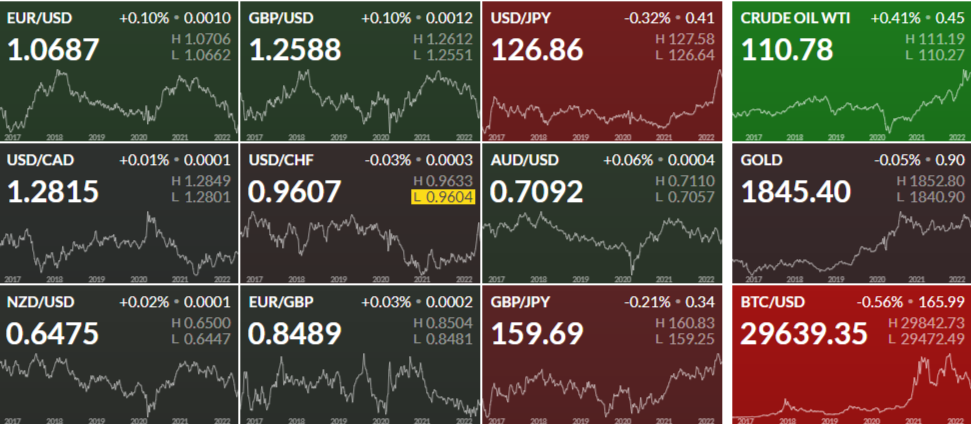
Last Wednesday, May 25, the eurozone PMI data was released. It presented a potential stumbling block for the euro after the currency showed a decent strengthening against the dollar. Both the manufacturing and services PMIs were expected to be lower than the April figures and indicated an unexpected downside.
On the other hand, the UK Composite PMI fell with the fourth-biggest loss of 6.4 points since the launch of the index with services providing the largest contribution to the decline in the economic outlook. The UK Flash data for May has witnessed the fastest rise in operating costs since the launch of the index, leading to the slowest rise in business activity since the global recovery from the pandemic.
The ECB has signaled it would act against what it sees as the unjustified fragmentation of the eurozone debt markets and is currently working on the tools required for that.
The US economy contracted at a negative 1.5% annual rate in the first quarter, ahead of a negative 1.4% start, as the revised government data released on Thursday revealed. Much of the weakness came from a record trade deficit as consumers opened their wallets and bought foreign goods.
In fact, consumer spending was revised higher in the first quarter to a 3.1%, up from the previous forecast of a 2.7% increase. The downward revision in GDP was caused by weaker inventories and household investments. This is the first decline in five quarters.
Gross Domestic Product, or GDP, news released by the US Bureau of Economic Analysis measures the total value of all products, services, and structures produced in each period.
EUR/GBP Soars to 18-Month High on the ECB Officials’ Hawkish Tone
Encouraging German GDP and consumer confidence data has EUR/GBP up after sharply declining in the previous session.
The pair edged higher as attention was drawn to British Chancellor Rishi Sunak, who is expected to announce a £10-billion cost-of-living crisis bailout package. This could include money off surging energy bills, help towards council taxes, and even a windfall tax on energy and oil companies’ surging profits. Any fiscal support from the government will need to be very targeted, or else it could increase inflationary pressures.
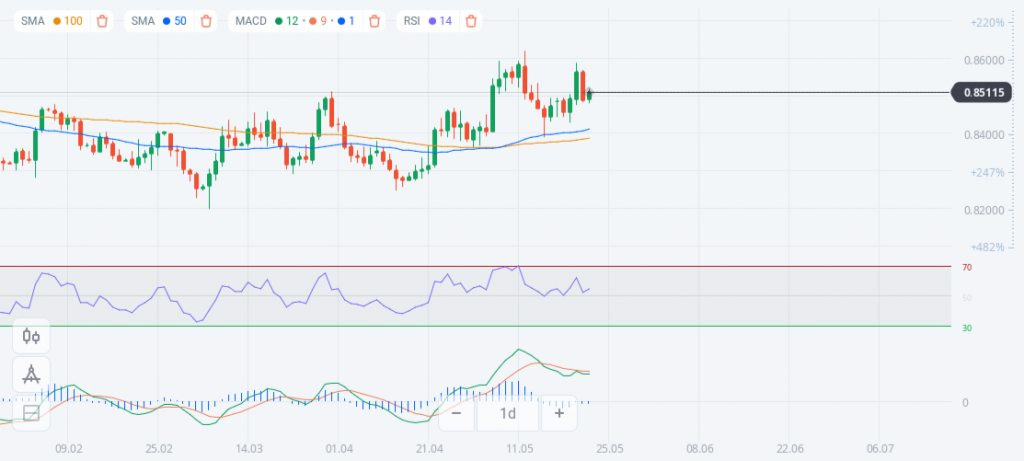
Technically, EUR/GBP continues to hold above its multi-month downtrend line, above 50-SMA and 100-SMA, and above an ascending trendline since April 18. The RSI is also above 30, indicating that there may be more gains ahead. Potential targets are the March high of 0.8510, the May-24 high of 0.8590, and the 2022-high of 0.8620.
USD/CAD Bearish Play
The American Dollar-Loonie pair maintains a weak technical tone.
The deteriorating global economic outlook continues to weigh on investor sentiment, as evidenced by the generally weaker tone around the equity markets. That allowed the safe-haven USD to stage a solid recovery from the monthly low hit on Tuesday.
Regardless, trade repositioning ahead of the key risk event on Wednesday prompted some USD short-covering and turned out to be a key factor extending support for the USD/CAD pair. While Canadian retail sales are underway, this should not prompt any important moves in the Loonie, given the data won’t move the needle for Bank of Canada (BOC) policy. As a reminder, the BOC is expected to raise interest rates by 50 basis points in the future.
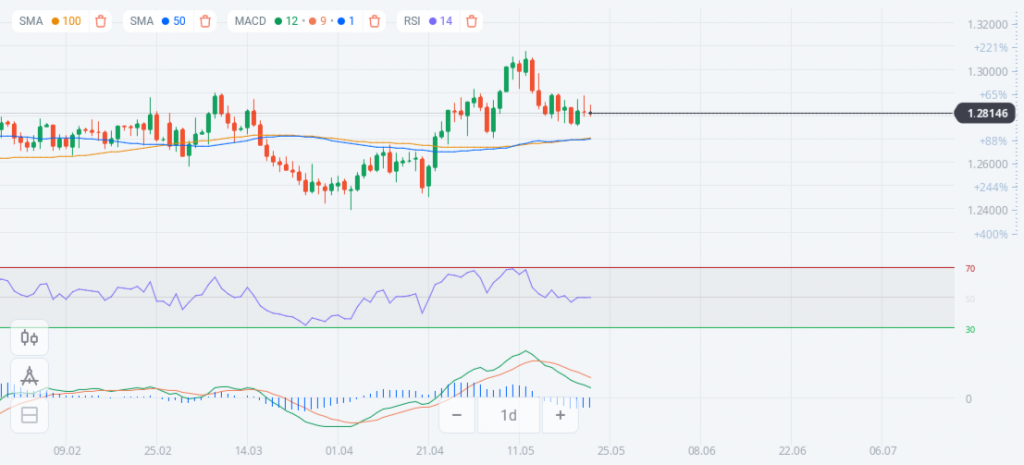
The USD/CAD pair continues to fluctuate around the level of 1.2800, challenged in the previous sessions. Currently, it consolidates below it, which keeps the bearish trend scenario active on the intraday basis, waiting to head towards 1.2770 as the next negative station.
Stock Markets
The Stock Market Seems to be Starting to Regain its Footing
Markets rejoice after Federal Reserve Minutes showed they are willing to be aggressive but flexible in the face of inflationary pressures and recession.
US stocks opened higher on Thursday as investors tried to sustain a rally while they digested the latest information from the Federal Reserve. Minutes of the Federal Reserve’s last meeting in early May indicated the central bank could slow the pace of its interest rate increases later this year if inflation trended lower and the labor market showed less of a demand-supply imbalance.
That cheered investors and has sent stocks higher. Much of what the Federal Open Market Committee said in the Minutes was largely as expected. Members favored a 50 basis point hike to the Fed’s benchmark interest rate in its June and July meetings, then could pull back to a quarter-point hike at their next meeting.
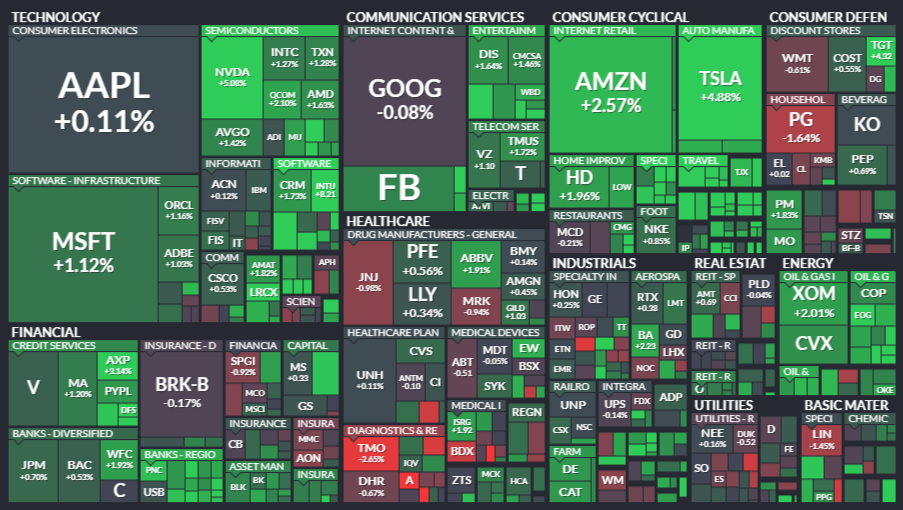
The market appears to have regained its footing this week, as investors expect inflation to start to peak, and there is good value to be found at these levels. The Dow and S&P 500 were up 2.75% and 2%, respectively, for the week. The Nasdaq rose 0.7%, and the Dow has also posted gains in the last four sessions.
While first-quarter earnings for the market as a whole were largely in line with historical trends, there was a dramatic pullback for some major stocks after the earnings report as investors looked for the impact of slowing inflation and economic growth. However, recent trading sessions have seen sharp drawdowns in some big-name stocks after earnings reports that affirmed investor worries about the impact of inflation on corporate margin.
Alibaba Stock Jumped
China bellwether stock Alibaba reported quarterly results Thursday that beat earnings and revenue estimates.
Alibaba shares surged 3% in the early trading session on Thursday following blows in the top and bottom lines in the fourth quarter, heavily influenced by strong demand for e-commerce and cloud services as the COVID lockdown grips parts of China.
Revenue grew 9% YOY in the quarter to $32.19 billion versus the consensus estimate of $29.64 billion. For the year, revenue grew 19%. The news offered some much needed relief to shareholders who have seen it lose all of the previous six years’ gains in the last 15 months, and as China’s government has taken a more aggressive approach to regulate what it sees as overly powerful Internet giants.
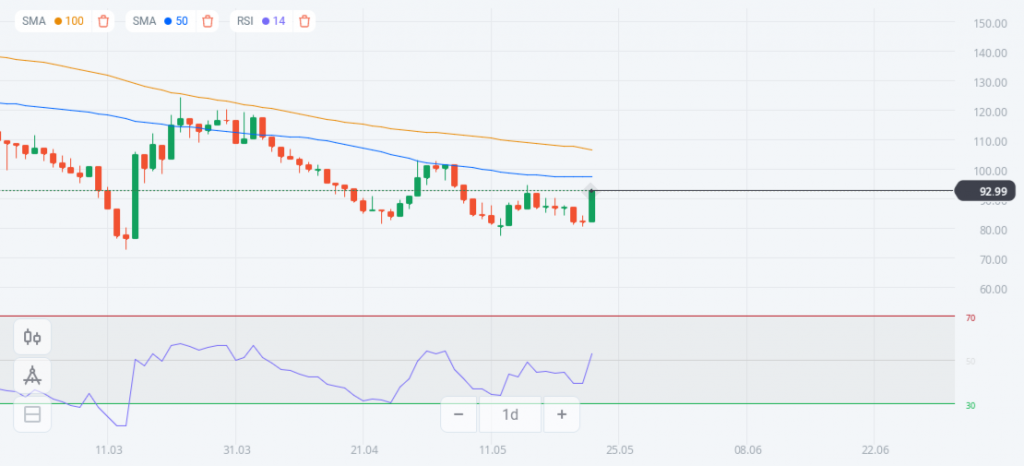
Alibaba shares will likely continue to rise, starting with a bullish trend. The stock will move towards the level of 97.42, which coincides with the 50-SMA. Later, it will likely move towards the level of 100. The latter is the closest resistance level, the round number level, and the psychological level at the same time.
Commodity Markets
Natural Gas and Brent Oil Prices Remain High
Natural Gas is renewing 13-year highs.
Last week, the price of Natural Gas reached a 13-year high at 9.426. Countries around the world are starting to build up supplies for next winter. Supply disruptions and uncertainty is the main cause of the uptrend. Additionally, China is gradually reopening after two months of COVID-19 lockdowns. This will likely increase the demand for energy resources.
The price is following uptrend line support from March 15. In the near term, support is in the vicinity of the trend line at 8.585, and resistance is around 10.000, which was last seen in 2008.
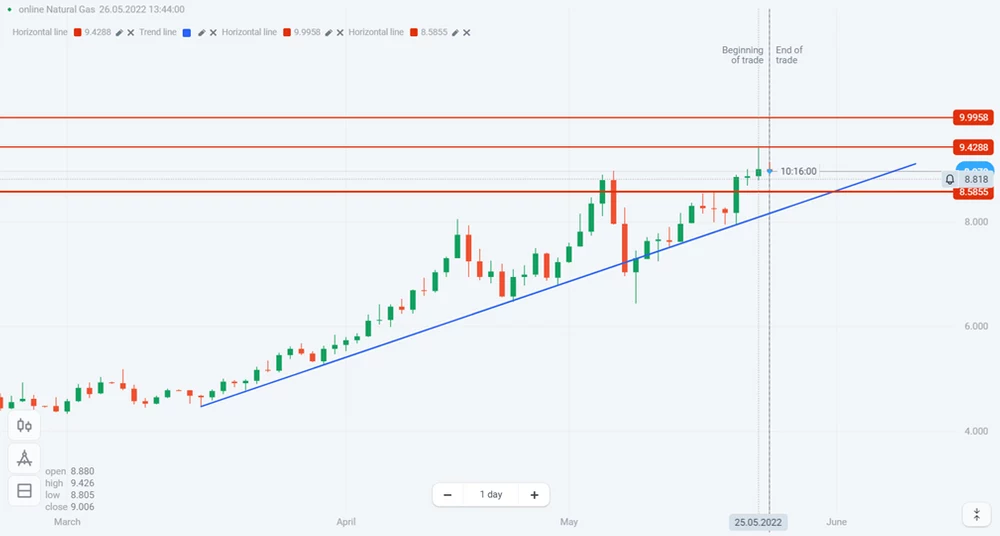
Brent Oil Stable Above $110 per Barrel
Last week, the price of Brent oil traded mostly flat, remaining above $110. The European Union is preparing the sixth package of sanctions against Russia. During this week’s EU summit, the bloc will discuss the oil embargo against Russia with Hungary being the only member state out of 27 to vote against it. The package requires complete agreement amongst all states in order to move forward. With the ongoing conflict, the energy market will remain under pressure, and prices will remain high.
In the near term, the price of Brent oil should trade around $110 with the resistance target at 114.140. Support is around 106.817.
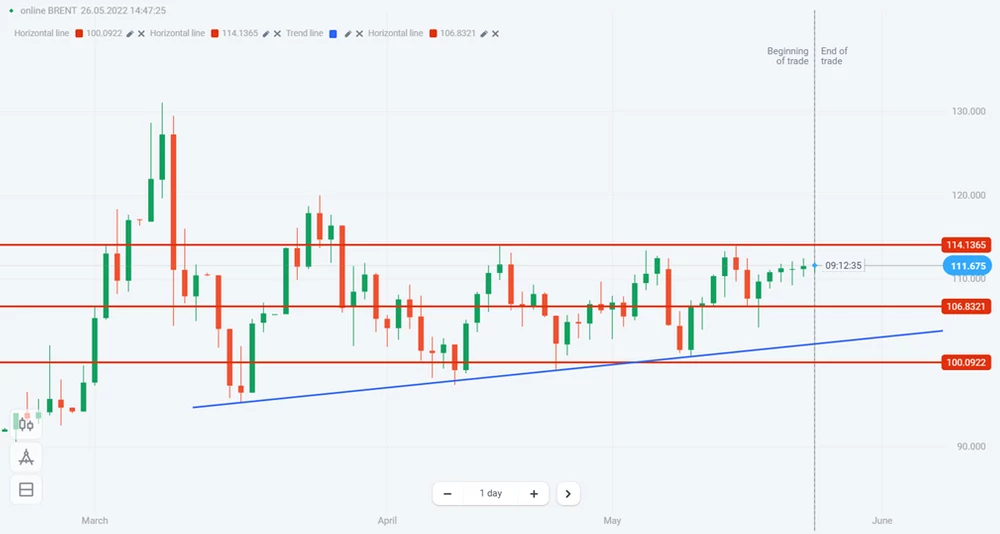
Following a correction to the 38.2% Fibo level and 200-EMA, Gold trades lower on confirmed FED rate hikes.
Stronger USD Makes Gold Less Attractive
Last week, the price of gold attempted to break above the 200-EMA. The price reached the 38.2% Fibonacci level but then dropped following the release of the US Fed’s Meeting Minutes. The FOMC Meeting Minutes of 50 basis points in June and July. The news gave a boost to the US dollar and, consequently, gold dropped because stronger USD makes gold less attractive to foreign investors.
Near term support for gold is the 23.6% Fibonacci retracement level at $1,835, followed by $1,820. Resistance is at the 50% Fibonacci retracement level around $1,890.
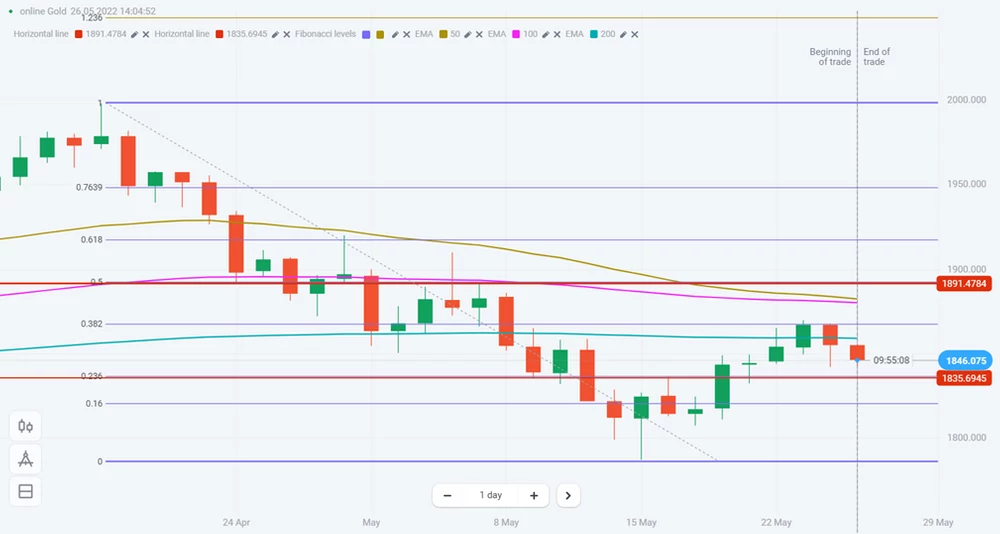
Cryptocurrency Markets
How Long can Bitcoin Trade in a Narrow Range Waiting for a Breakout?
JP Morgan supports Bitcoin.
The price of Bitcoin has been dropping for nine weeks in a row. For the past several weeks, the price has been trading in a narrow f[range]=[A trading range occurs when a security trades between consistent high and low prices for a period.]. Macroeconomic challenges such as the conflict between Russia and Ukraine, which was among the factors that added to the increasing inflationary dynamics, dampened the outlook for crypto assets as they are deemed too risky for investors.
The price of BTC is staying above a strong support level of 28,668. This level was acting as a support level in January and June-July 2021. Last week, JP Morgan Chase strategists stated that BTC has “significant upside potential” with a target of $38,000.
It is hard to say when crypto buyers are going to take charge. In the near term, the resistance level is at 30,675, and support is at 28,668. In the meantime, when crypto assets, particularly Bitcoin, breakout, the moves are usually strong and volatile.
